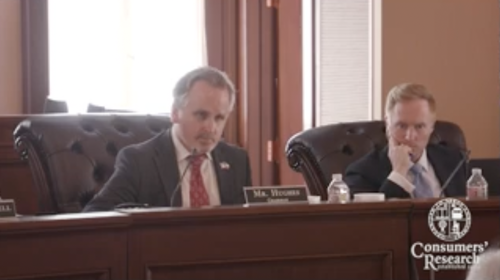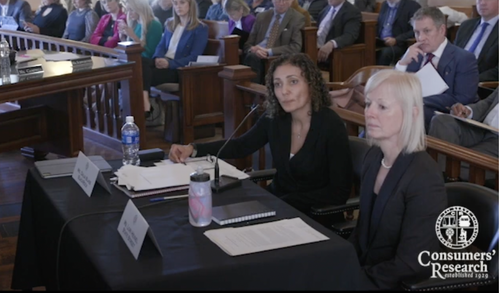Texas state senators struggled for more than six hours last week to get straight answers from Wall Street giants BlackRock and State Street, two of the world’s largest asset managers, regarding what they are doing to compel companies whose shares they own to get in line with the ESG movement.

Having joined global Environmental, Social and Governance (ESG) clubs like Climate Action 100+ and the Net Zero Asset Managers initiative (NZAM), and signed pledges to leverage their voting power as the largest shareholders in 90 percent of the S&P 500 companies to “reach net zero emissions by 2050 or sooner across all assets under management,” the asset managers testified that, in reality, they are doing no such thing.
When asked by Senate Chairman Bryan Hughes to clarify BlackRock’s pledge to Climate Action 100+ “to secure commitments from companies to reduce greenhouse gas emissions consistent with the Paris Agreement,” BlackRock’s Head of External Affairs Dalia Blass responded that BlackRock merely talks to companies whose shares they own to learn about their “material risks and opportunities.”
“We participate in Climate Action 100 to engage in dialogue with other participants, market participants, governments so that we understand issues that are relevant to our clients,” said Blass, who recently joined BlackRock from the Biden Administration where she worked at the Securities and Exchange Commission (SEC). The motto of Climate Action 100+ is “Global investors driving business transition.”

“The website doesn’t say anything about engaging in dialogue in Climate Action 100,” Hughes responded. “BlackRock’s website says, ‘We have joined Climate Action 100 to help ensure the world’s largest greenhouse gas emitters take necessary action on climate change.’ True or false?”
To which, Blass responded, “Sir … what I can say … two things …”
Having repeated the question, Hughes asked, “Can BlackRock send us a witness who can tell us whether that’s a true or false statement on its website today?”
“Sir, if you pulled that off our website, then that is on our website,” Blass responded.
State Street and BlackRock are two of the “Big Three” largest asset managers. Together with Vanguard, they manage approximately $20 trillion in assets on behalf of corporations, governments, and endowments, as well as the savings of tens of millions of people who are investing through vehicles like 401K plans. Vanguard recently withdrew from its membership in NZAM and was excused from testifying in Texas.
Asset managers who support ESG policies typically make two contradictory claims. In order to make a case that they are not violating their fiduciary duty to people whose savings they manage, they argue that ESG is not an ideology but rather an essential risk-management tool that they use to generate higher returns for their clients.
In a 2021 Euromoney interview, State Street Global Advisors’ Chief Investment Officer Lori Heinel explained that “companies who pay attention to their ESG footprint and profile, and proactively manage that, actually are better managed companies and that accrues to a longer term shareholder result.”
Simultaneously, asset managers claim that, despite what they may have said or pledged, they actually don’t do anything to push the ESG agenda on companies, and are in fact active supporters of the fossil fuel industry.
Blass told the senators that it has $107 billion invested in public energy companies in Texas. “We’ve invested in Texas energy, just the past two years, $31 billion,” she said. “We believe in these investments; we do not boycott oil and gas.”
State Sen. Bob Hall asked: “Where’s the empirical data that supports that net zero is good for the bottom line, that it actually would improve income, improve revenue? And the rest of the things that are stuck in that woke analysis, where is the empirical data that says this will actually be a benefit to the investment?”

Blass responded that, based on BlackRock’s research, “we believe that an orderly transition to a low carbon economy is much more beneficial for our clients’ portfolios. A disorderly transition can cost the global economy about a 25 percent reduction in GDP.”
Heinel told the Texas senators, “I have no evidence that this is good for returns in any time frame. In fact, we’ve seen the evidence to be quite contrary. Last year if you didn’t own energy companies you did miserably compared to broad benchmarks. The year before, that was quite the opposite … but that was just a happenstance, that’s not because it’s a good investment.”
Regarding compliance with ESG criteria, BlackRock CEO Larry Fink stated at the New York Times 2017 DealBook summit that “behaviors are going to have to change, and this is one thing that we’re asking companies. You have to force behaviors, and here at BlackRock we are forcing behaviors.”
Hughes cited a statement from Fink to CEOs in 2020: “Climate change has become a defining factor in companies’ long-term prospects. … we are on the edge of a fundamental reshaping of finance.” He asked Blass how BlackRock thought finance should be reshaped.
Blass responded that the goal of finance as BlackRock sees it has always been “to find opportunities for our clients and to manage risks in their portfolios so that we can produce the best risk-adjusted returns.” BlackRock’s mission, she said, hasn’t changed.
Hughes told Blass: “What we’re learning is, BlackRock says whatever it needs to say to whoever it’s talking to at the time,” he said. “That’s what we’re experiencing today.”
Heinel testified that, like BlackRock, State Street joined various ESG clubs like Climate Action 100+, Ceres, and the Glasgow Financial Alliance for Net Zero (GFANZ) merely to learn “how to think about climate change,” Heinel said. “We’re trying to understand how these various risks are becoming as important as traditional financial risks,” citing as an example new taxes that may be imposed in Europe on “companies that they believe are bad actors from a climate standpoint.”
When asked to clarify why companies should follow ESG criteria, asset managers cite the effect of government policies, like taxes and penalties for companies that don’t comply with ESG criteria, as well as state subsidies for renewable energy, all of which are part of what Blass called the “net zero transition, the transition to a low carbon economy.” According to clubs like Climate Action 100+ and GFANZ, the role of asset managers who join these clubs is to compel companies whose shares they own into compliance.
Heinel testified that, as an index fund manager, Vanguard must buy and hold the shares of companies included in a given index such as the S&P 500. Therefore, if they want to influence companies’ behavior, they must work with executives of those companies rather than avoid their shares.
“We engage with companies in our portfolios; we do not divest,” Heinel said. State Street currently owns more than $140 billion in shares of energy companies.
On the other hand, she said, “we do not discriminate against companies in any sector, including energy companies … That means we do not tell those energy companies to shift their strategy, or to drill more wells.”
Texas senators brought up the case of the Pirky power plant, a coal-fired plant located near the hearing site, which though operationally viable is being shut down by its parent company, American Electric Power (AEP), shares of which are owned by BlackRock.
“Climate Action 100 says AEP is one of [BlackRock’s] focus companies, and as you know, Climate Action 100 assesses utility companies based on whether they’ve assigned a retirement date to each and every coal unit with a full phase out by 2040,” Hughes said. He quoted from a paper co-authored by BlackRock and GFANZ, titled “How to Facilitate the Early Retirement of High Emitting Assets,” which stated that asset managers must “manage down the greenhouse gas emissions from their portfolios rather than divest and transfer them to someone with less climate ambition.”
“That means that GFANZ, working with BlackRock, has said it’s better to make the companies keep the coal plants and manage them down, that means shut them down, rather than sell them to someone else who will keep operating them and keep the power and the jobs coming,” Hughes stated.
Blass responded that “managing down” doesn’t mean closing plants and that BlackRock is an investor in carbon-capture technology to reduce emissions.
State Sen. Brian Birdwell noted that one third of Texas electricity generation comes from coal-fired plants and said “we’re scared to death about what you’re going to do to our citizens in the state of Texas.”
“You told us earlier that your objective was to maximize investments,” Hall said. “Now you’re telling us that your objective is zero carbon emissions. Which is it?”
“Our objective as a fiduciary asset manager is to provide the best risk adjusted returns for our clients,” Blass said. “We do that by looking at how the companies are managing their risks and as the global regulators, including here in the United States, are moving more and more towards a regulatory system around net zero and carbon production, we look at how they’re managing that to make sure that long-term they’re able to produce results for our clients.”
Texas State Sen. Lois Kolkhorst said she worried about the “the disadvantage for our country as we bend to ESG but some of our competitors do not.” China has dramatically increased its investment in coal-fired power plants, she said, but “right here in the county in which we sit, we’re going to decommission a coal plant because of ESG scoring; because AEP is being forced to do that to be eligible to compete to get funds.”
“China, Russia, and India are putting their countries first,” Kolkhorst told Blass and Heinel. “While we’re all bending to some scoring where you all sit around a table.”
Hall said that when the pollution and emissions from the construction and disposal of wind turbines and solar panels is factored in, the environmental benefits of renewable energy are unclear.
“All the concrete and steel and construction, that gets left out of the carbon analysis and they just pretend that it only exists once it’s in place and the blades are turning,” Hall said. “The analysis that ignores the manufacturing and the disposal process of solar panels—huge impact to the environment, that gets left out. So we’re going to run around say, ‘Oh, this is low carbon impact.’
“It’s not, it’s a lie.”
Read more here...







